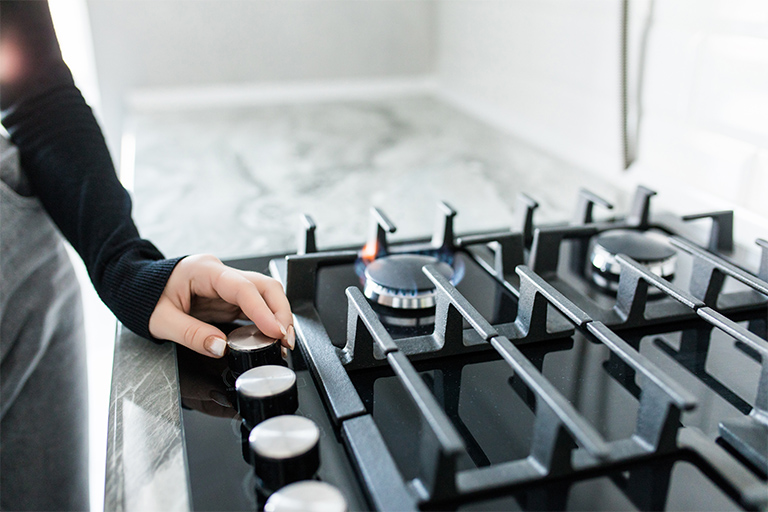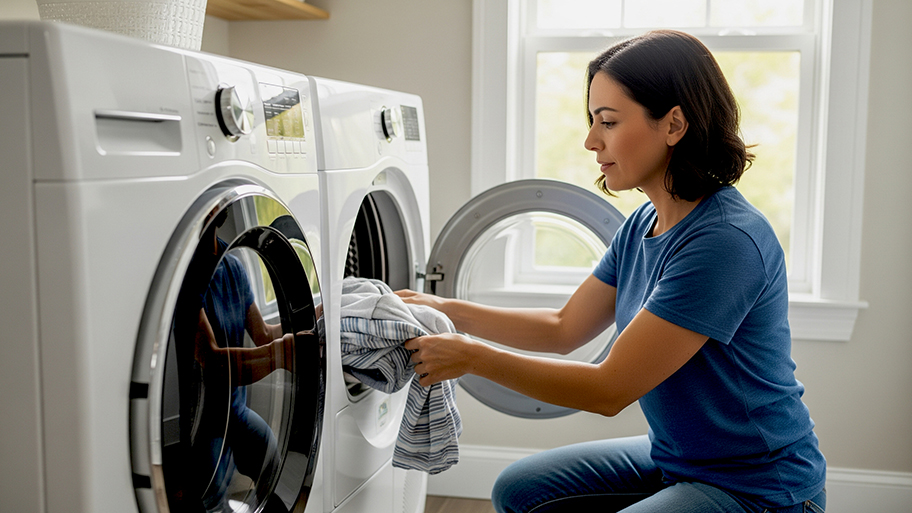
Discover the cost to install a gas cooktop. Learn about average prices, key cost factors, and tips to save on your gas cooktop installation project.
The cost to install washer and dryer hookups averages $1,200, with most homeowners paying between $650 and $2,500 on average. Your price depends on hookup type, project scope, and labor.


The cost to install washer and dryer hookups varies by hookup type, project complexity, and labor.
Permits are often required for code compliance and cost $50 to $300, depending on your scope and where you live.
Professional installation ranges from $45 to $200 per hour, depending on the pros you hire, and ensures safety and long-term reliability.
The average return on investment (ROI) for adding washer and dryer hookups is 40% to 70%.
This article was created using automation technology and thoroughly fact-checked and edited by an Angi Editor in accordance with our AI policy.
The cost to install washer and dryer hookups ranges from $650 to $2,500, with an average cost of $1,200 for most homeowners. Prices depend on factors like hookup type, project scope, and labor rates. Installing hookups may also involve plumbing, electrical, and venting work.
Whether you’re adding laundry to a new space or updating an old setup, understanding these costs helps you plan a safe, efficient installation. We’ll break down everything you need to know about the cost to install washer and dryer hookups in this guide.

When you install washer and dryer hookups, several key factors drive your final bill. Let’s break down what you’re paying for and why.
The scope of your washer and dryer hookup project directly impacts the total cost. If you’re installing a single washer connection, your expenses will be lower than for a full washer and dryer setup. Compact units may cost less to install than standard side-by-side appliances, especially in tight spaces.
The further your hookup is from existing plumbing or electrical lines, the more labor and materials are needed. For multi-unit buildings or larger homes, expect additional costs for expanded infrastructure.
| Type of Hookup | Description | Average Cost |
|---|---|---|
| Single washer | Plumbing and drain only | $500–$1,000 |
| Washer + dryer | Full laundry setup (plumbing, electrical/gas, venting) | $1,000–$2,500 |
| Stackable units | Compact, vertical installation, may require modifications | $900–$2,500 |
| Utility room install | Ample space, easier access to plumbing/electrical | $1,000–$2,200 |
| Closet install | Tight space, may need custom work | $1,200–$2,500 |
| Multi-unit install | Several hookups for apartments or duplexes | $2,500–$10,000+ |
The type of washer and dryer hookup you choose is a major driver of project cost. Electric dryers need a 240-volt outlet and proper venting, while gas dryer setups require a gas line, venting, and additional safety considerations. Washer-only hookups focus on plumbing and drainage. Combo washer-dryer units have unique installation needs due to their design and ventless options. Retrofitting an existing space can be more expensive than installing hookups during new construction. Each type comes with its own pros and cons, affecting both price and convenience.
| Type | Average Cost | Notes | Pros | Cons |
|---|---|---|---|---|
| Electric dryer hookup | $300–$900 | Requires 240V outlet, venting | Simple wiring, widely available | Higher electric bills |
| Gas dryer hookup | $400–$1,200 | Needs gas line, vent, safety inspection | Faster drying, lower utility cost | Gas line cost, more regulations |
| Washer-only hookup | $300–$1,000 | Plumbing, drainage only | Lowest cost, less complex | No dryer convenience |
| Combo washer-dryer unit | $700–$1,500 | Needs custom plumbing, sometimes ventless | Space-saving, easy to install in tight spots | Smaller loads, longer cycles |
| Retrofit existing space | $1,200–$2,500 | Adapt current room, may need wall/floor work | Uses existing area | More demolition, potential surprises |
| New construction | $650–$2,000 | Install during build, easier utility access | Lower labor cost if included in build | Must plan ahead during construction |

Where you live and where you place the hookups in your home both affect your total investment. Labor costs are higher in urban areas, while rural installations may be less expensive but involve travel fees.
Basement installations are often simpler due to utility access, but second-floor or garage setups sometimes require longer plumbing and electrical runs. Hard-to-reach or multi-story locations increase cost due to added complexity.
You’ll need skilled tradespeople for this project—usually a plumber and electrician, sometimes a general contractor. Plumbers charge $45 to $200 per hour, while electricians charge $50 to $130 per hour. Plumbing labor covers water supply and drainage, while electrical labor includes wiring and outlet installation.
Venting for dryers may require a specialist. Labor costs rise with project complexity, region, and site accessibility. Standard installs take four to eight hours, while complex jobs may require a full day or more. Minimum service fees often apply.
Most cities require permits for plumbing, electrical, or gas work. Permit costs range from $50 to $300, depending on your municipality. Inspections may add $50 to $150 per visit. Not obtaining the right permits can result in fines, project delays, or even the need to redo work. Always confirm requirements with your local building department.
Optional upgrades can increase project cost, but also add functionality and convenience. Here are some common features to add:
Utility sink: $250 to $600
Cabinetry or shelving: $150 to $1,000
Soundproofing: $100 to $300
Water shut-off valve, leak detector, or smart home features: $50 to $400
Custom cabinetry, built-in solutions, or premium venting (rigid ductwork, vent covers) also increase your investment.
Project complexity has a major impact. Retrofitting an older home, working with thick or concrete walls, or running utilities over long distances adds time and labor. Tight spaces or obstacles (like moving existing appliances or breaking through walls) can drive costs higher.
Some additional costs include:
Preparation tasks such as demolition, removal of old hookups, or bringing in new materials add $100 to $500.
Post-construction cleanup and debris removal may cost an additional $50 to $200.
If you design a custom laundry area, architectural or design fees can range from $500 to $2,000.
Some costs go beyond installation—think long-term maintenance, warranties, and recurring expenses.
Many installers and manufacturers provide warranties for labor and materials. Standard warranties are often included, but extended warranties can add $50 to $300. Warranties typically cover defects in workmanship or parts, but not accidental damage or neglect.
Once your hookups are ready, you’ll pay ongoing utility costs. Electric dryers cost more to run than gas. Expect an average of $10 to $30 per month in increased electricity or gas bills, depending on usage and appliance efficiency. Energy-efficient appliances can lower long-term costs and qualify for rebates or incentives.
Routine maintenance keeps washers and dryers running safely. Annual vent cleaning costs $100 to $200 and helps prevent fire hazards. Checking for leaks, tightening connections, and cleaning filters are essential. Repair costs for minor issues (like leaks or electrical fixes) range from $75 to $350.
You’ll pay sales tax on materials and appliances, usually 5% to 10% depending on your state. Some areas levy local taxes or service fees on installation labor.
Installing new hookups may impact your homeowners' insurance premium, especially if adding laundry to an upper floor or finished space. Contractors should carry liability insurance, and you’ll want to confirm coverage for water or electrical damage. Check your policy and discuss with your provider to ensure you’re protected.
Some homeowners consider DIY to save money, but this project involves plumbing, electrical, and venting—each with its own safety risks and code requirements. If you have the right skills and tools, you can save on labor, but still need to pay for materials and permits.
DIY installation often costs $300 to $900 in materials, plus $50 to $200 for permits and tool rental. You’ll need plumbing and electrical know-how, the right tools (wrenches, pipe cutters, wire strippers, drill), and a solid understanding of local codes.
DIY projects can take a full weekend or longer, especially for first-timers. Mistakes can lead to leaks, electrical hazards, or code violations—so hiring a pro is recommended for complex, gas, or multi-story installations.
Sometimes, you can repair existing hookups instead of replacing them. Minor leaks, loose connections, or vent cleaning are repairable at a lower cost. If your connections are outdated, unsafe, or fail inspection, replacement is the better choice. The age of your setup, warranty status, and extent of damage influence this decision. If repair costs exceed 50% of replacement, opt for new hookups for safety and efficiency. Repairs run $75 to $900, while full replacement ranges from $650 to $2,500.
| Scenario | Repair Cost | Replacement Cost | Recommendation |
|---|---|---|---|
| Minor leak, loose connection | $75–$200 | $650–$1,200 | Repair |
| Vent cleaning needed | $100–$200 | $650–$1,200 | Repair |
| Outdated plumbing/electrical | $250–$500 | $1,000–$2,500 | Replace if over 10 years old |
| Code upgrade required | $300–$600 | $1,200–$2,500 | Replace for safety/compliance |
| Major water or electrical damage | $500–$900 | $1,800–$3,000 | Replace |
Adding washer and dryer hookups is a highly sought-after upgrade for homebuyers and renters alike. The average return on investment (ROI) ranges from 40% to 70%, especially in homes that previously lacked in-unit laundry. New hookups increase convenience, modernize your home, and can boost resale value.
Compared to other home improvement projects, laundry upgrades offer a strong ROI, particularly in urban or multi-family housing markets. Value increases with safe, efficient, and well-designed installations, and can make rental properties more marketable and command higher rents.
Consider these cost-saving strategies to make your washer and dryer installation more budget-friendly:
Get multiple quotes from licensed local appliance installation professionals to compare rates.
Choose standard hookups over custom or luxury options.
Install hookups near existing plumbing and electrical lines to minimize labor.
Consider bundling with other home improvement projects.
Purchase materials and appliances during sales or with rebates.
Perform simple prep or cleanup tasks yourself to reduce labor charges.
Home is the most important place on earth, which is why Angi has helped more than 150 million homeowners transform their houses into homes they adore. To help homeowners with their next project, Angi provides readers with the most accurate cost data and upholds strict editorial standards. We extensively research project costs to develop the pricing data you see, so you can make the best decisions for you and your home. We rely on reputable sources, including the U.S. Bureau of Labor Statistics, academic journals, market studies, and interviews with industry experts—all to ensure our prices reflect real-world projects.
Want to help us improve our cost data? Send us a recent project quote to [email protected]. Quotes and personal information will not be shared publicly.
From average costs to expert advice, get all the answers you need to get your job done.

Discover the cost to install a gas cooktop. Learn about average prices, key cost factors, and tips to save on your gas cooktop installation project.

Replacing a dryer belt costs more than just the part unless you can DIY it. The labor cost can easily surpass 90% of the product cost, so if you are handy with tools, try it yourself first.

Dryer repair costs as little as $10, but sometimes, replacing your dryer is more cost-effective. But if you have to make repairs, here’s how much it’ll cost.

Dealing with a clogged dishwasher? Use this guide on how to drain a dishwasher to empty it and clear out any debris that’s causing a backup.

Using your stove can cause smoke, smells, and grease to build up in your kitchen and home. Find out how much CFM your range hood needs to kick them to the curb.

Did you leave the gas on? If you went out and forgot to turn off the stove, don’t panic. Instead, remain calm and follow a few basic steps.